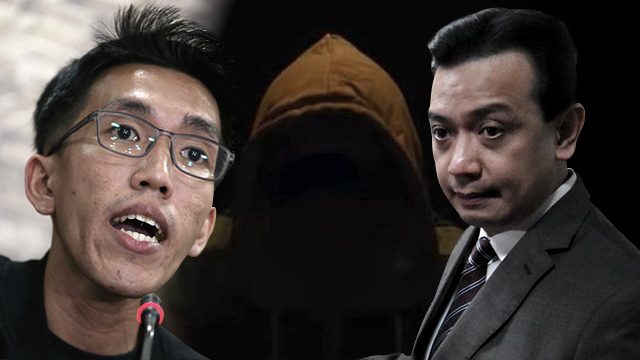SUMMARY
This is AI generated summarization, which may have errors. For context, always refer to the full article.

MANILA, Philippines – In 1947, a man named Oscar Espuelas circulated a photograph of himself as if hanging lifeless from a tree. The staged photograph was accompanied by a supposed suicide note signed with a pseudonym, Alberto Reveniera, who declared that the “Philippine government is infested with many Hitlers and Mussolinis.”
“Teach our children to burn pictures of Roxas if and when they come across one. I committed suicide because I am ashamed of our government under (President Manuel) Roxas. I cannot hold high my brows to the world with this dirty government,” said the note, which was sent to and published in local newspapers in Visayas and other publications in the country.
In 1951, the Supreme Court (SC) found Espuelas guilty of inciting to sedition.
Nearly 7 decades later, the Espuelas case would be cited in the resolution of the Department of Justice (DOJ) that justified an inciting to sedition charge against Rodel Jayme, the creator of the website alleged to have spread videos damaging to the family of President Rodrigo Duterte.
Rodel Jayme charge
Inciting to sedition is taking part in the publication or circulation of scurrilous libels against government authorities, which will tend to disturb or hinder the official from carrying out his or her functions.
This is the provision on the crime of inciting to sedition under Article 142 of the Revised Penal Code:
The penalty of prision correccional in its maximum period and a fine not exceeding 2,000 pesos shall be imposed upon any person who, without taking any direct part in the crime of sedition, should incite others to the accomplishment of any of the acts which constitute sedition, by means of speeches, proclamations, writings, emblems, cartoons, banners, or other representations tending to the same end, or upon any person or persons who shall utter seditious words or speeches, write, publish, or circulate scurrilous libels against the Republic of the Philippines or any of the duly constituted authorities thereof, or which tend to disturb or obstruct any lawful officer in executing the functions of his office, or which tend to instigate others to cabal and meet together for unlawful purposes, or which suggest or incite people against the lawful authorities or to disturb the peace of the community, the safety and order of the Government, or who shall knowingly conceal such evil practices.
The High Court convicted Espuelas for publishing material that “incites rebellious conspiracies or riots and tends to stir up people against the constituted authorities.”
Metrobalita.net, the domain that Jayme created, did not produce the videos. It also was not the original uploader. But the National Bureau of Investigation (NBI) said it significantly spread the videos.
Although Jayme claims to have only created the domain for Metrobalita.net and did not have a hand in uploading videos on the site, the DOJ still charged him with inciting to sedition because – citing the Espuelas case – “it was a clear act to arouse among its viewers a sense of dissatisfaction against the duly constituted authorities.”
Inciting to sedition
In ending his phony suicide note, Espuelas said, “I committed suicide because I have no power to put under Juez de Cuchillo all the Roxas people now in power.”
Juez de cuchillo means summary execution through use of a knife.
Thus, the SC said, Espuelas clearly “suggested the decapitation or assassination of all Roxas officials.”
“And such suggestion clinches the case against appellant,” the Court said in its ruling.
Did the Bikoy videos suggest the same? No. (READ: Legal questions on the arrest of ‘Bikoy’ video sharer)
But inciting to sedition also covers acts which “disturb the peace of the community, the safety and order of the Government.”
That is how the DOJ justified its charge against Jayme, saying in its resolution: “It is a known fact that President Duterte has declared an all-out war against drugs, and a video containing these allegations cannot but be interpreted as a scheme to weaken the confidence of the people in the Government. These acts are against public peace and are criminal in nature as they tend to incite to a breach of the peace and are conducive to the destruction of the very government itself.”
Antonio Trillanes
Jayme is not the first person to be charged with inciting to sedition under the Duterte administration. The President’s fiercest enemy, Senator Antonio Trillanes IV, was the first to be accused of the crime. He faces two charges of inciting to sedition.
The first was filed in March last year, 4 months after he said in a privilege speech baring Duterte’s alleged unexplained wealth that soldiers could now use their M60 guns on the President. He made the comment in response to Duterte’s earlier statement that the latter can be shot or ousted if anyone can find more than P40 million in his bank account.
The second is for statements Trillanes made during the height of his legal battle over his amnesty last year, when Duterte’s allies accused him of encouraging the overthrow of the government.
Addressing the police and the military amid rumors of his warrantless arrest, Trillanes had said, “Duterte will not be there for long; please do not do anything illegal or unconstitutional.”
Trillanes’ statement did not contain any words explicitly calling for Duterte’s ouster, but Senior Deputy City Prosecutor Dolores Rillera still charged the senator with inciting to sedition.
“Under the dangerous tendency rule, there is inciting to sedition when the words uttered or published could easily produce disaffection among the people and a state of feeling in them incompatible with a disposition to remain loyal to the government and obedient to the laws,” said Rillera.
Clampdown on dissent?
Does this spell a clampdown on dissent?
Lawyer Romel Bagares, one of the petitioners against Republic Act No. 10175 or the Cybercrime Prevention Act of 2012, used the example of Chavez vs Gonzales, where the High Court declared as unconstitutional the government warnings against news organizations that published contents of the “Hello, Garci” tape.
Chavez vs Gonzales was not a case of inciting to sedition but it made use of what is called the clear and present danger rule. The case was during the Gloria Arroyo administration, when The Daily Tribune was charged with inciting to sedition for publishing opinion columns that “continuously maligned and undermined the present administration.”
The judiciary uses the clear and present danger rule to settle questions of freedom of speech.
The DOJ said the Bikoy videos are “not an exercise of his freedom of speech and expression.” Note that the DOJ charged Jayme for inciting to sedition in relation to the Cybercrime Prevention Act, even though the SC had already declared as unconstitutional the provision penalizing “aiding and abetting” of a cybercrime precisely to uphold the freedom of speech.
The SC said in the Chavez case that there is a clear and present danger when “words are used in such circumstances and are of such a nature as to create a clear and present danger that they will bring about the substantive evils that the lawmaker has a right to prevent.”
“This rule requires that the evil consequences sought to be prevented must be substantive, ‘extremely serious and the degree of imminence extremely high,’” said Bagares, citing the Court.
Bagares also said that proving inciting to sedition comes with an “evidentiary requirement [that] is a high hurdle to surmount.”
“All the surveys in the last few months, including those covering the period when the first Bikoy videos came out, show that the President’s numbers have never been higher – he continues to enjoy the trust and praise of the people. In other words, the Bikoy videos don’t seem to make the message and impact they are accused of making here,” Bagares said. – Rappler.com
Add a comment
How does this make you feel?





There are no comments yet. Add your comment to start the conversation.